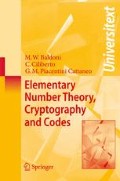In the previous chapters, we met more than once the notion of a prime number (see § 1.3.1, Remark 3.1.10 and so forth). In this chapter we are going to investigate further this notion, first by proving the Fundamental Theorem of Arithmetic 4.1.2, well known since primary school, which basically states that prime numbers are the building blocks from which, by multiplication, all integer numbers can be obtained. This theorem will yield several important consequences: we shall for instance deduce a formula to compute Euler function φ(n) (see § 3.3), and much more. Moreover, we shall frame the notion of prime number in a more general context, studying similar notions in an arbitrary ring, among them the ring of polynomials over a field.
As we shall see, prime numbers and the Fundamental Theorem of Arithmetic play a basic role in the applications to cryptography and to coding theory. But how can we tell if a number is prime? And how can we write an arbitrary number as a product of prime numbers? In this chapter we shall discuss some classic, and therefore elementary, algorithms for these tasks. We shall see that, unfortunately, these algorithms are in general exponential and are so of little practical use. It will then be necessary to find more efficient algorithms requiring more advanced mathematical tools: we shall discuss such algorithms later (see Chapter 6).
Access this chapter
Tax calculation will be finalised at checkout
Purchases are for personal use only
Preview
Unable to display preview. Download preview PDF.
Rights and permissions
Copyright information
© 2009 Springer-Verlag Berlin Heidelberg
About this chapter
Cite this chapter
(2009). Finite is not enough: factoring integers. In: Elementary Number Theory, Cryptography and Codes. Universitext. Springer, Berlin, Heidelberg. https://doi.org/10.1007/978-3-540-69200-3_4
Download citation
DOI: https://doi.org/10.1007/978-3-540-69200-3_4
Publisher Name: Springer, Berlin, Heidelberg
Print ISBN: 978-3-540-69199-0
Online ISBN: 978-3-540-69200-3
eBook Packages: Mathematics and StatisticsMathematics and Statistics (R0)

